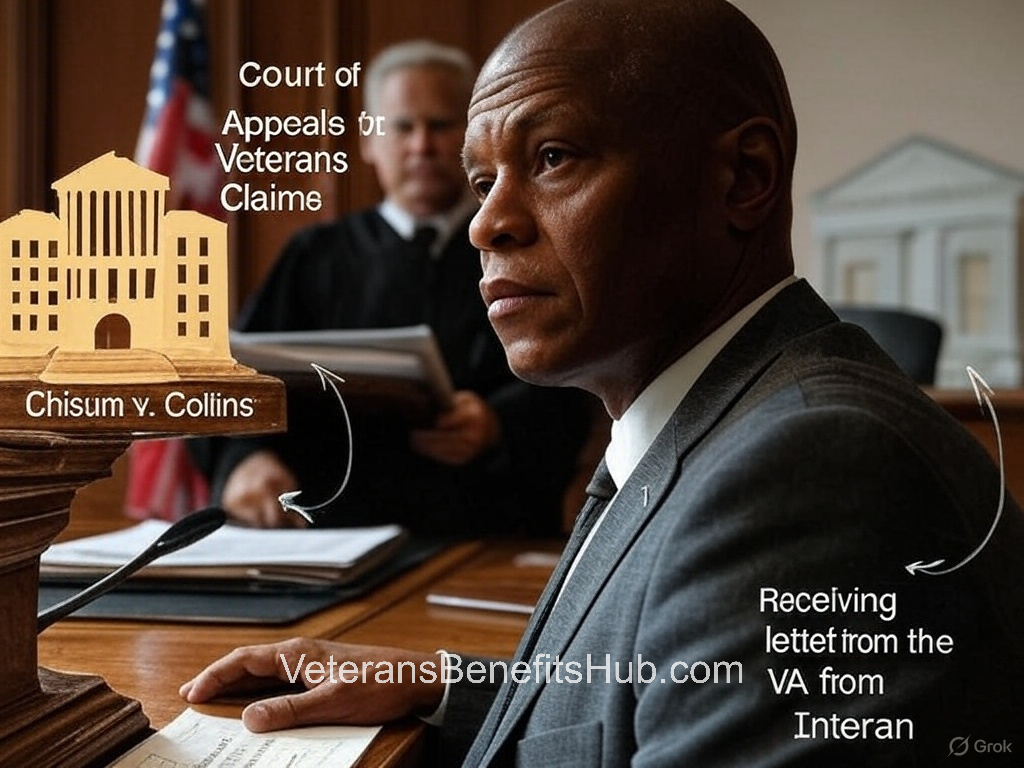How a New VA Case in 2025 Could Revolutionize Benefits

Chisum v. Collins: A Game-Changer for Veterans’ Supplemental Claims
I’m excited to dive into a groundbreaking case fresh from the Court of Appeals for Veterans Claims: Chisum v. Collins. This decision has far-reaching implications for veterans navigating the VA’s claims process, particularly around supplemental claims and requests for increased ratings. Let’s break it down and explore why this case matters.
Case Background: The Players and the Stakes
Chisum v. Collins involves Chisholm Chisholm & Kilpatrick (CCK), a prominent New England-based VA disability benefits law firm known for its robust advocacy. Surprisingly, this case, which could reshape aspects of the Appeals Modernization Act (AMA), hinged on a modest dispute over $300 in attorney’s fees—a small sum for a firm of CCK’s stature but one that sparked significant legal questions.
In November 2019, a veteran sought an increase in disability ratings, which the VA denied in February 2020. CCK then filed a higher-level review, but the VA didn’t budge. Within a year, the veteran submitted additional evidence and a request for Total Disability Based on Individual Unemployability (TDIU) using VA Form 21-8940. By April 2022, the VA granted increased ratings but refused to pay attorney’s fees, arguing that TDIU requests are considered “requests for increase,” not supplemental claims, which don’t qualify for fee awards under VA regulations.
The Court’s Ruling: Supplemental Claims Are a “Vibe,” Not Just a Form
The Court of Appeals for Veterans Claims made a bold statement: a supplemental claim doesn’t have to be filed on VA Form 20-0995 to be valid. Instead, the court emphasized the veteran’s intent. In this case, the TDIU request was deemed a supplemental claim because it aimed to challenge the VA’s prior decision with new evidence. This ruling challenges the VA’s rigid insistence that specific forms dictate the nature of a claim.
Why does this matter? For years, veterans have faced delays and denials when the VA reclassifies their supplemental claims as requests for increase, requiring a VA Form 21-526EZ. This reclassification can disrupt “continuous pursuit,” a critical concept under the AMA that allows veterans to preserve earlier effective dates if they challenge a decision within one year. Losing continuous pursuit can cost veterans months—or even years—of retroactive benefits.
The Appeals Modernization Act: A Quick Refresher
Enacted in February 2019, the AMA introduced three ways to challenge VA decisions: supplemental claims, higher-level reviews, and appeals to the Board of Veterans’ Appeals. Filing any of these within one year of a decision maintains continuous pursuit, potentially securing an effective date back to the original claim. However, a request for increase (filed on Form 21-526EZ) doesn’t preserve this benefit, creating a trap for veterans who believe they’re appealing but are instead starting anew.
The VA’s practice of redirecting supplemental claims to Form 21-526EZ has led to confusion, delays, and lost benefits. For example, a veteran might file a supplemental claim (Form 20-0995) to dispute a rating, only to receive a letter—sometimes months later—stating they should have filed a 526EZ. This not only stalls the claim but risks forfeiting earlier effective dates.
Why Chisum v. Collins Is a Big Deal
The court’s ruling in Chisum v. Collins pushes back against the VA’s form-centric approach, affirming that a claim’s substance matters more than its paperwork. This could open doors for veterans whose claims were improperly reclassified, potentially unlocking significant retroactive benefits. For attorneys, it’s a tool to argue for earlier effective dates in cases where the VA has dismissed supplemental claims as “wrong form” filings.
Consider this scenario: A veteran files a supplemental claim in 2020 but, six months later, receives a VA letter demanding a 526EZ. They comply, get an increase, but the effective date is set to the 526EZ filing, not the earlier 0995. Under Chisum v. Collins, that original supplemental claim might still count, preserving continuous pursuit and securing back pay from the earlier date. In cases with long histories of underrated disabilities, this could mean tens of thousands in retroactive benefits.
A Word of Caution
While this decision is promising, don’t expect immediate changes. The VA is likely to appeal to the Federal Circuit, prolonging implementation. Moreover, the VA’s reliance on automated systems means non-standard forms may still be rejected outright. For now, veterans should continue using Form 20-0995 for supplemental claims to avoid delays.
Navigating these nuances requires expertise. Veterans should work with accredited representatives—attorneys, Veterans Service Officers (VSOs), or organizations like the DAV or VFW—who can review their entire claims file to ensure no opportunities are missed. The complexity of effective dates, intents to file, and continuous pursuit underscores the need for professional guidance.
What Veterans Should Do Next
If you’ve received a VA decision you disagree with, act quickly. You have one year from the decision date to file a supplemental claim, higher-level review, or appeal to maintain continuous pursuit. Missing this window could limit your effective date and reduce benefits. If you’ve been told you filed the “wrong form” or suspect an error in your rating, reach out to an accredited representative for help.
Chisum v. Collins is a reminder that the VA’s process isn’t always rigid. With the right advocacy, veterans can challenge bureaucratic hurdles and secure the benefits they’ve earned. Stay informed, stay proactive, and don’t hesitate to seek assistance.
Disclaimer
This article reflects, in part, the opinions of the author based on their interpretation of the Chisum v. Collins case and its potential implications. It is not legal advice. Veterans should consult with accredited representatives or legal professionals for guidance specific to their claims.
